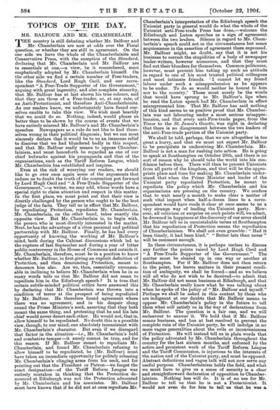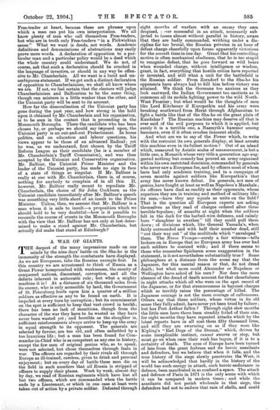-.---■••■■•■•
MR. BALFOUR AND MR. CHAMBERLAIN. THE country is still debating whether Mr. Balfour and Mr. Chamberlain are now at odds over the Fiscal question, or whether they are still in agreement. On the one side we have the whole of the Chamberlainite and Conservative Press, with the exception of the Standard, declaring that Mr. Chamberlain and Mr. Balfour are in essentials at one,—a view, be it remembered, most emphatically adopted by Mr. Chamberlain himself. On the other side we find a certain number of Free-traders, like the Standard, Lord Hugh Cecil, and our corre- spondent " A Free-Trade Supporter of the Government," arguing with great ingenuity, and also complete sincerity, that Mr. Balfour has at last shown his true colours, and that they are those of a Free-trader, or, at any rate, of an Anti-Protectionist, and therefore Anti-Chamberlainite. As our readers know, we unfortunately have found our- selves unable to take this view. We wish most heartily that we could do so. Nothing, indeed, would please us better than to be shown by the course of events that we have entirely misread Mr. Balfour's and Mr. Chamberlain's speeches. Newspapers as a rule do not like to find them- selves wrong in their political diagnosis ; but we can most sincerely declare that it would be to us an immense relief 'to discover that we had blundered badly in this respect, and that Mr. Balfour really means to oppose Chamber- lainism, and must henceforth be regarded as one of our chief bulwarks against his propaganda and that of the organisations, such as the Tariff Reform League, which Mr. Chamberlain has established and inspires.
Even at the risk of wearying our readers, we should like to go over once again some of the arguments that induce us to doubt the truth of the contention put forward by Lord Hugh Cecil and " A Free-Trade Supporter of the Government,"—a writer, we may add, whose words have a special right to claim attention and respect in this matter. In the first place, we must point out that their view is directly challenged by the person who ought to be the best judge of the facts. They tell us in effect that Mr. Balfour, by repudiating Protection, repudiates Mr. Chamberlain. Mr. Chamberlain, on the other hand, takes exactly the opposite view. But Mr. Chamberlain is, to begin with, the person who is most directly interested in the matter. Next, he has the advantage of a close personal and political partnership with Mr. Balfour. Finally, he has had every opportunity of knowing the working of Mr. Balfour's mind, both during the Cabinet discussions which led to the rupture of last September and during a year of bitter public controversy in the House of Commons and outside it. Mr. Chamberlain, therefore, must be in a position to know whether Mr. Balfour, in first giving an explicit definition of Protection, and then denouncing Protection, meant to denounce him also. Are we, then, essentially unreason- able in inclining to believe Mr. Chamberlain when he in so many words tells us that Mr. Balfour did not mean to repudiate him in the Edinburgh speech ? It is true that certain subtle-minded political critics have answered this by declaring that Mr. Chamberlain was thrown into a condition of terror at the prospect of being repudiated by Mr. Balfour. He therefore found agreement where there was no agreement, and in his despair clung round the Prime Minister's neck, asserting that they both meant the same thing, and protesting that he and his late chief would never desert each other. He would not, that is, allow himself to be repudiated. No doubt this is a possible view, though, to our mind, one absolutely inconsistent with Mr. Chamberlain's character. But even if we disregard that factor in the situation—i.e., Mr. Chamberlain's bold and combative temper—it surely cannot be true, and for this reason. If Mr. Balfour meant to repudiate Mr. Chamberlain, and found Mr. Chamberlain refusing to allow himself to be repudiated, he (Mr. Balfour) must have taken an immediate opportunity for politely releasing Mr. Chamberlain's clinging arms from his neck, and for pointing out that the President or Patron—we forget the exact designation—of the Tariff Reform League was entirely mistaken in thinking that the Protection .de- nounced at Edinburgh was not the Protection advocated by Mr. Chamberlain and his associates. Mr. Balfour must have known that if he did not at once repudiate Mr. Chamberlain's interpretation of the Edinburgh speech the Unionist party in general would do what the whole of the Unionist anti-Free-trade Press has done,—welcome the Edinburgh and Luton speeches as a sign of agreement between the two leaders. Silence in regard to Mr. Cham- berlain's speech could not in the circumstances but mean acquiescence in the assertion of agreement there expressed. Mr. Balfour might, no doubt, say that it is not his business to correct the stupidities of a body of newspaper leader-writers, however numerous, and that they must find out their blunders for themselves. Common politeness, however, must prevent him taking up such an attitude in r ard to one of his most trusted political colleagues and most intimate friends. I cannot let my friend labour under such a misapprehension as he appears to be under. To do so would neither be honest to him nor to the country.' Those must surely be the words that would have sprung to Mr. Balfour's lips when he read the Luton speech had Mr. Chamberlain in effect misrepresented him. That Mr. Balfour has said nothing of this kind seems to us positive proof that Mr. Chamber- lain was not labouring under a most serious misappre- hension, and that every anti-Free-trade paper, from the Times to the St. James's Gazette, was right in declaring that there is no disagreement between the two leaders of the anti-Free-trade portion of the Unionist party.
We shall be told, perhaps, that we are altogether in too great a hurry, and that we must not expect Mr. Balfour to be precipitate in undeceiving Mr. Chamberlain. Mr. Balfour is not a man for rushing into action. He is going to speak at Southampton on October 28th, and there is no sort of reason why he should take the world into his con- fidence before then. There will then be present Unionists from all parts of the kingdom, and that will be the appro- priate place and time for making Mr. Chamberlain under- stand that when the Prime Minister and leader of the Unionist party repudiated Protection, he meant to repudiate the policy which Mr. Chamberlain and his organisations are pressing on the country. We confess that to wait nearly a month to make clear a matter of such vital import when half-a-dozen lines to a corre- spondent would have made it clear at once seems to us a very strange way of leading the Unionist party. How- ever, all criticism or surprise on such points will, we admit, be drowned in happiness at the discovery of our error should Mr. Balfour tell us in unmistakable terms at Southampton that his repudiation of Protection means the repudiation of Chamberlainism. We shall not even grumble " Had it been timely, it had been kind." " Better late than never " will be comment enough.
In these circumstances, it is perhaps useless to discuss any further the points raised by Lord Hugh Cecil and A Free-Trade Supporter of the Government." The matter must be cleared up in one way or another at Southampton. For if Mr. Balfour does not then return to the point, but leaves matters in their present condi- tion of ambiguity, we shall be forced—and so we believe will all who do not wish to be deceived—to admit that Mr. Balfour did not mean business at Edinburgh, and that Mr.,Chamberlain really knew what he was talking about when he spoke of the policy of " Mr. Balfour and myself." Perhaps we shall be asked in this context by those who are indignant at our doubts that Mr. Balfour means to oppose Mr. Chamberlain's policy in the future to tell them what will satisfy us in the way of declarations from Mr. Balfour. The question is a fair one, and we will endeavour to answer it. We hold that if Mr. Balfour means business, and has at last resolved to prevent the complete ruin of the Unionist party, he will indulge in no mere vague generalities about the evils or inconveniences of Protection. He will instead tell us in plain words that the policy advocated by Mr. Chamberlain throughout the country for the last sixteen months, and enforced by the active and persistent work of the Tariff Reform League and the Tariff Commission, is injurious to the interests of the nation and of the Unionist party, and must be opposed. Abstract definitions and vague talk Will not now serve any useful purpose. Chamberlainism holds the field, and what we =1st have to give us a sense of security is a clear and straightforward declaration of opposition to Chamber- lainism. Nothing less will do. It is of no use for Mr. Balfour to tell us that he is not a Protectionist. . It would not even do for him to tell us that he was a Free-trader at heart, because these are phrases upon which a man can put his own interpretation. We all know plenty of men who call themselves Free-traders, but who are in truth only Free-traders " in a Pickwickian sense." What we want is deeds, not words. Academic definitions and denunciations of abstractions may easily prove mere words. A declaration of opposition to a par- ticular man and a particular policy would be a deed which the whole country could understand. We do not, of course, ask that such a declaration should be couched in the language of invective, or should in any way be offen- sive to•Mr. Chamberlain. All we want is a lucid and un- ambiguous statement. If we get such a distinct declaration of opposition to Chamberlainism, we shall all know where we are. If not, we feel certain that the electors will judge Chamberlainism and Balfourism to be the same thing, though one mixture is a little weaker than the other, and the Unionist party will be sent to its account.
How far the demoralisation of the Unionist party has gone during the past year, and how strong is the hold upon it obtained by Mr. Chamberlain and his organisation, is to be seen in the contest that is proceeding in the Monmouth Boroughs. There the candidate who has been chosen by, or perhaps we should say imposed upon, the Unionist party is an out-and-out Protectionist. In home politics, and on education and labour questions, his views appear to be those of an advanced Radical ; yet he was, as we understand, first chosen by the Tariff Reform League as their candidate (he is a member of Mr. Chamberlain's Tariff Commission), and was then accepted. by the Unionist and Conservative organisation. Mr. Balfour, the Unionist Prime Minister and the leader of the Unionist party, has made no sign in face of a state of things so singular. If Mr. Balfour is really at one with Mr. Chamberlain, there is, of course, nothing for anybody to complain of in all this. If, however, Mr. Balfour really meant to repudiate Mr. Chamberlain, the choice of Sir John Cockburn as the Unionist candidate immediately after Mr. Balfour's speech was something very little short of an insult to the Prime Minister. Unless, then, we assume that Mr. Balfour is a man whom it is safe to insult—a proposition which we should hold to be very doubtful—how is it possible to reconcile the course of events in the Monmouth Boroughs with the view that Mr. Balfour has not only at last deter- mined to make a stand against Mr. Chamberlain, but actually did make that stand at Edinburgh ?











































 Previous page
Previous page